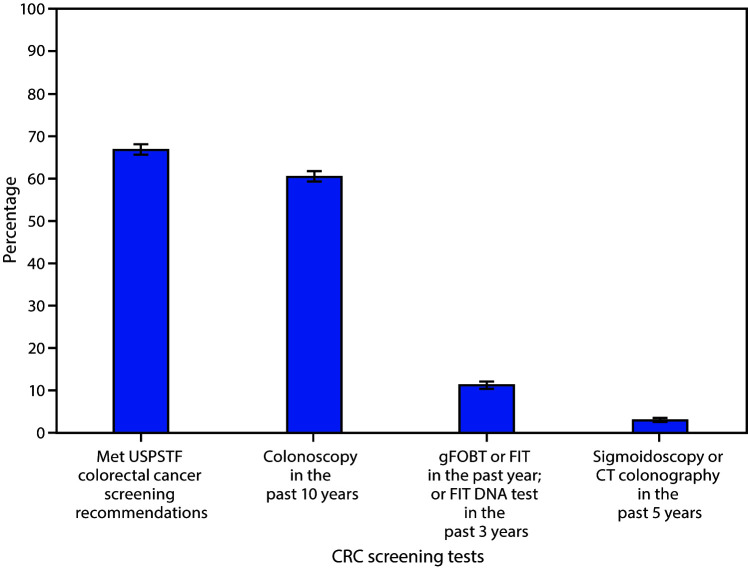In 2018, 67.0% of U.S. adults aged 50–75 years met the U.S. Preventive Services Task Force recommendations for colorectal cancer screening; 60.6% had a colonoscopy in the past 10 years. An estimated 11.3% had either a gFOBT or FIT within the past 1 year, or had a FIT DNA test in the past 3 years. Fewer adults, 3.1%, had a sigmoidoscopy or CT colonography in the past 5 years.
Source: National Health Interview Survey, 2018. https://www.cdc.gov/nchs/nhis.htm.
Footnotes
Abbreviations: CT = computed tomography; FIT = fecal immunochemical test; gFOBT = guaiac-based fecal occult blood test; USPTF = U.S. Preventive Services Task Force.
USPSTF screening recommendations for colorectal cancer (CRC) for adults of average risk include alternative tests and specified time intervals beginning at age 50 years and continuing until age 75 years: colonoscopy every 10 years; flexible sigmoidoscopy or computed tomography (CT) colonography every 5 years, or flexible sigmoidoscopy every 10 years plus fecal immunochemical test (FIT) every year; FIT DNA test every 3 years; guaiac-based fecal occult blood test (gFOBT) or FIT test annually.
† Sample adults aged ≥40 years were asked in separate questions if they ever had a named recommended colorectal test and if so when was the most recent test. Colorectal tests included colonoscopy, sigmoidoscopy, CT colonography or virtual colonoscopy, gFOBT, FIT, and FIT DNA (Cologuard) test. Respondents could answer yes to more than one test; the tests were not mutually exclusive.
§ Estimates are based on household interviews of a sample of the civilian, noninstitutionalized U.S. population and are derived from the National Health Interview Survey. Estimates are presented with 95% confidence intervals indicated by error bars. Persons with a personal history of colorectal cancer were excluded from these analyses.



